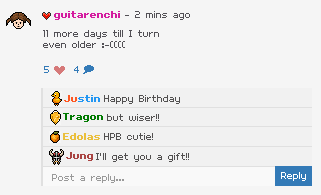Would you rather settle for someone because it’s the time to, or wait a lifetime for the person of your dreams? This was the question that gnawed at middle-aged Li-Ann (Wong Lilin) for many years in The Leap Years,directed by Jean Yeo. It was adapted from Catherine Lim’s novella Leap of Years.
On her “6th birthday” on February 29th, Li-Ann teaches her students about an Irish tradition where women propose to men on leap days. She then meets Jeremy (Ananda Everingham) later that day. Their story then follows through in segments of 4 leap days (16 years in total).
Soon enough, one would find leap days to be a central motif in the story. It also helps to push the story’s timeline along, making the story happen effectively in about 4 days or so. The leap years were clearly separated, simply by an animation of a Chinese calendar with an English quote (all of which were by famous people, can't remember if they were related to love or not) on it. In those five leap days, one would see Li-Ann through many highs and lows of her life.
Li-Ann meets Jeremy on her “6th birthday” and is instantly smitten with him. She then proposes a date by using the Irish tradition of women proposing to men on leap days. Jeremy, a dreamy but mysterious man, spends the evening with her but leaves on the same night, and proposes a meeting every leap year at the same place. This leaves Li-Ann longing for him until the next leap day, and is portrayed by her treasuring the little windmill given to her as a gift.
One other major character in Li-Ann’s life is KS (Qi Yuwu), who is her childhood friend, and holds a torch for her. Over one or two leap years, KS goes through a rough patch, pining for Li-Ann all while she is head over heels for Jeremy. KS is a simple and kind-hearted man, and is later shown in the movie to help Li-Ann to understand her true desires. He was effectively played by Qi Yuwu, and fit well as a loyal friend who doesn’t speak English fluently.
The song choices for the movie were mostly by local singer Corrine May, and they were rather well-chosen. The music fit the atmosphere of the scenes well and helped to better bring out the essence of the scenes.
One thing I noticed was the way dates were pronounced in the movie as compared to how we would in Singapore. Locally, we would read our dates as “29th (of) February”, but the film uses “February 29th”, which is the American way of pronouncing dates. This was mildly jarring to me, since the film is set in Singapore, so I really saw no reason for the use of American dates.
The scenes in which Joan Chen acted looked extremely jarring in comparison to the rest of the scenes, which is not surprising, since those scenes were filmed by a second unit director. The extra scenes were extremely whitewashed and too cool in colour tone to match the rest of the film. The addition of these scenes was a marketing decision, where it was believed that she would help the distribution of the film. Personally, her presence made no difference to me and the movie was fine as it is without those extra scenes.
I liked the overarching theme of this story, and it asks: would you rather settle with what you currently have, or would you stick to chasing your dream, even if that means you don’t know how long it’ll take? A question like this is bound to transcend nations and regions, because eventually, the film did extremely well in both China and Canada.
In all, I would rate The Leap Years 3.5 stars out of 5. It’s personally not something I would love to rewatch, but it will be a pleasant, light-hearted
love story to indulge in, if you’re into that.
More articles



